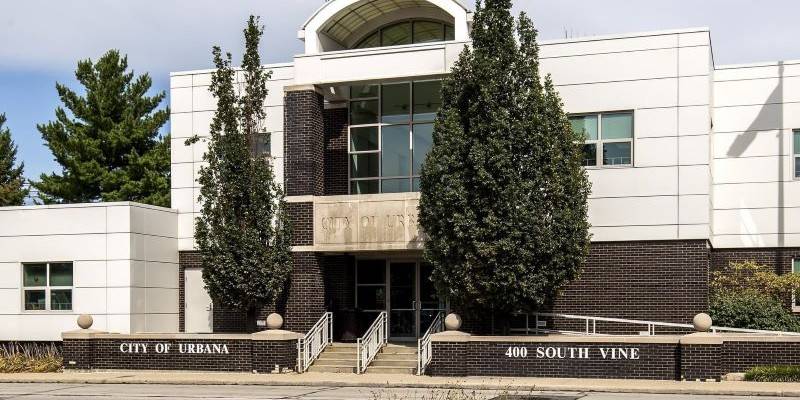Police reform is having a cultural moment. A lot of people are vocally outraged. After the murder of George Floyd during his May 25th arrest, protests around the world have called for police reform and government accountability. Protests in town have continued to this day, with some sparked by Urbana Mayor Diane Marlin’s reinstatement of Police Chief Bryant Seraphin.
Urbana Police Lieutenant Joel Sanders presented a proposal to the Urbana City Council on Monday aimed at reforming the way the city handles first response. The proposal, called One Door, aims to “provides services to members of our community involved in an active crisis and is a resource for our most vulnerable citizens,” according to the presentation given by Sanders. “The goal is to get police officers out of the mental health system.”
The basic outline of the One Door proposal is that C-U at Home, a 501(c)3 not-for-profit, will manage and operate a facility at 70 E Washington St, Champaign, their current headquarters. This facility will include the capacity for evaluation for mental health and substance abuse issues as well as staff devoted to case management and following up with people who are served by the new programming. This facility will also serve as the home base of a new “crisis response team” which will act as co-responders with police, meaning that they will respond to 911 calls about crisis situations “within 30 minutes” of a call, according to Sanders. Rosecrance’s Central Illinois Crisis Team currently provides a similar service, but they cover a four county region. The new team’s area of operation would be restricted to Champaign County.
Though initially the police will be involved for crisis related 911 calls, Sanders is hopeful that a “2.0 version” of One Door will include a crisis response team acting as first responders without police present, and only calling for police or medical assistance when necessary. Sanders says that involving police in the mental health system is “mission creep” and that police have “gotten away from what our mission really is.”
Sanders and Rob Dalhaus, the executive director of C-U at Home, both expect that a pilot version of One Door will be ready to implement in the first quarter of 2021.
According to Sanders’ proposal, the program will cost between $1.847 million and $2.147 million in its first year, $1.292 million in its second, and $2.207 million each year after that. This includes new capital requirements, staffing costs, and training. This figure will rely on private donations to program partners, organizational commitments from program partners, and government funding. Dalhaus says C-U at Home has contracted architects from Farnsworth Group to draft initial designs for the necessary renovations to the building at 70 E Washington.
Though he didn’t have exact figures, Dalhaus, predicts One Door has the “potential to save the community a lot of money in the long run.” He says this will be due to lower rates of emergency room visits and fewer people spending time in community jails unnecessarily.
Similar “co-responder” models have found success in Tuscon, Kansas City, and throughout Colorado, among other places. One Door is closely modeled on Peoria’s “No Wrong Door” system and facets of Crisis Intervention Team International’s program of police training.
The Urbana City Council heard Sanders’ half hour proposal and spent an hour in questions and discussions surrounding it. Mayor Marlin introduced the proposal by citing the United States Conference of Mayors’, “Report on Police Reform and Racial Justice,” calling for cities to, in her words, “explore and pilot alternative response models that include behavioral health professionals.” The One Door proposal has been in the works for the past 18 months and Sanders has been involved in reforming police response to crisis intervention since October 2012. Representatives from One Door program partners Carle Foundation Hospital, Rosecrance Central Illinois, and C-U at Home attended the meeting.
Though no votes were taken at the city council meeting on this issue, several city council members voiced support for the proposal. Julie Laut, the recently appointed Ward 2 alderman, said in an interview: “I wholeheartedly support a reassessment” of policing, adding that One Door “isn’t the perfect solution, but I am glad.”
Dennis Roberts, the Ward 5 alderman, said in an interview “I think that the program offers a lot of hope.” Roberts said “one of the most difficult [concerns] is funding,” citing the fact that the police department budget has been cut by “about 10%” since 2008.
In questioning the proposal’s financial requirements during the meeting, Maryalice Wu, the Ward 1 alderman said “I guess we will expect to see a budget amendment in the near future.”
According to Sanders’ presentation, there were 2067 police contacts with individuals in crisis, which led to 148 arrests in 2019 across Champaign County. Urbana’s publicly accessible “Police Incidents” database lists 690 incidents in the “Crisis Intervention” category for 2019, 676 of which were administratively closed or referred to another jurisdiction.
One Door is largely being shepherded by the Crisis Intervention Team Steering Committee, an informal committee of representatives from the police and government as well as business, nonprofit, and community leaders. Carle Foundation Hospital, Rosecrance, and C-U at Home are current program partners. (Joel Sanders is on the Board of Directors of C-U at Home, though he receives no financial or material compensation, according to Dalhaus.)
Though this program is not being proposed as a direct response to recent protests and calls to “defund the police,” Sanders did say that “command-level” discussions have been going on surrounding the issue. He said “The police do need to make changes to how we provide service.”
Mayor Marlin echoed the need for reform in a statement at Monday’s meeting. She said “you gotta start somewhere and I think this is an excellent place to start.”








